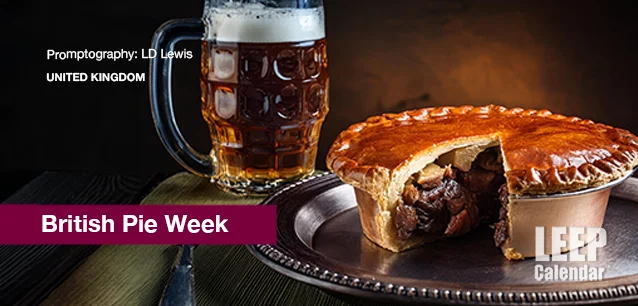 AD
AD
Today is: November 22
Scroll to explore events active on this date.
Additional Events on LEEP
LEEP INK FEATURES

August is Appropos
A toddler playing in the fountain at a park in Santa Fe, New Mexico—Photo LD Lewis. In August, we live through the Dog Days of Summer. It's hot and often humid, and those ...

September is Sassy
Can you hear that sigh of relief from parents worldwide? Yes! September marks the return of students to school, a global phenomenon. Preparations for the ACT and SATs begin earnestly for ...

OOH LA LA, October
October is the busiest month for events, with 5% more happening than in May, the second most eventful month. Sailing enthusiasts will be glued to the finals of this year's Am...
About British Pie Week
United Kingdom & Ireland
Ends: Mar 09, 2025
DESCRIPTION:
BRITISH PIE WEEK
British Pie Week, by Jus-Rol, began in 2007 and occurs each March during the first week, starting Monday. It celebrates everything pie, and local restaurants and markets often support it.
HISTORY OF ENGLISH PIE
Pies have a long and storied history in England, dating back to medieval times. The concept of a pie originated in ancient civilizations, where people encased meat and other fillings in a pastry shell to preserve the contents. However, the English pie as we know it began to take shape during the medieval period.
Medieval Period:
In medieval England, pies were a practical way to preserve food. The pastry, known as a "coffin," was thick and inedible, serving primarily as a container for the contents. These early pies were often filled with meats, including game, and kept food fresh during long journeys or periods without refrigeration.
Renaissance and Elizabethan Eras:
During the Renaissance, pies became elaborate and were served at banquets and feasts. The fillings diversified to include not only meat but also fruits and custards. The pastry itself migrated to a more edible form.
17th and 18th Centuries:
By the 17th and 18th centuries, pies had become a staple in English cuisine. Sweet pies, particularly fruit pies, gained popularity alongside the traditional savory pies.
19th Century to Present:
The Industrial Revolution and advancements in baking technology further popularized pies. Pies remain an integral part of British culinary tradition, celebrated in sweet and savory forms.
WHAT IS A PIE?
A pie is a baked dish consisting of a pastry dough casing that contains a filling of various sweet or savory ingredients. The key components of a pie include:
Pastry Crust—as a top, bottom, or fully encased (top and bottom) crust.
Filling—including a range of meats and vegetables (savory pies) to fruits, custards, and creams (sweet pies).
BRITISH VS AMERICAN PIES
While the basic concept of pies is similar in both England and the United States, there are some notable differences:
Crust—English pies often have a thicker, more robust pastry crust than American pies' typically lighter, flakier crust.
Filling—English pies are traditionally more savory, with popular varieties including steak and kidney, chicken and mushroom, and meat pies. On the other hand, American pies are renowned for their sweet varieties, such as apple pie, pecan pie, and pumpkin pie.
Presentation—English pies are frequently served as part of a meal, often accompanied by vegetables and gravy. American pies generally are served as desserts.
THE UK'S MOST POPULAR PIES
Steak and Kidney Pie—A classic British pie filled with diced beef, kidney (often from a lamb), and onions, all cooked in a rich gravy.
Chicken and Mushroom Pie—Contains chicken and mushrooms in a creamy sauce, often with a hint of herbs.
Shepherd's Pie—Though technically a pie, it has a mashed potato topping rather than a pastry crust and is filled with minced lamb and vegetables.
Cottage Pie—Similar to Shepherd's Pie but made with minced beef instead of lamb.
Pork Pie—A traditional English cold meat pie filled with pork surrounded by a hot water crust pastry.
Cornish Pasty—commonly filled with beef, potatoes, swedes (rutabagas), and onions.
Fruit Pies and Tarts—While less common than savory varieties, fruit pies like apple pie and tarts (such as Bakewell tart) are also popular.
Pies in the UK continue to be a beloved part of the culinary landscape, reflecting the country's rich history and regional diversity.
VIDEOS
Currently, this event does not have supporting videos.
SUPPORTING DOCUMENTS
Currently, this event does not have supporting documents.
ADDITIONAL IMAGES
Currently, this event does not have supporting images.
Where would you like to go now?
 AD
AD


/footer-logo.svg)
